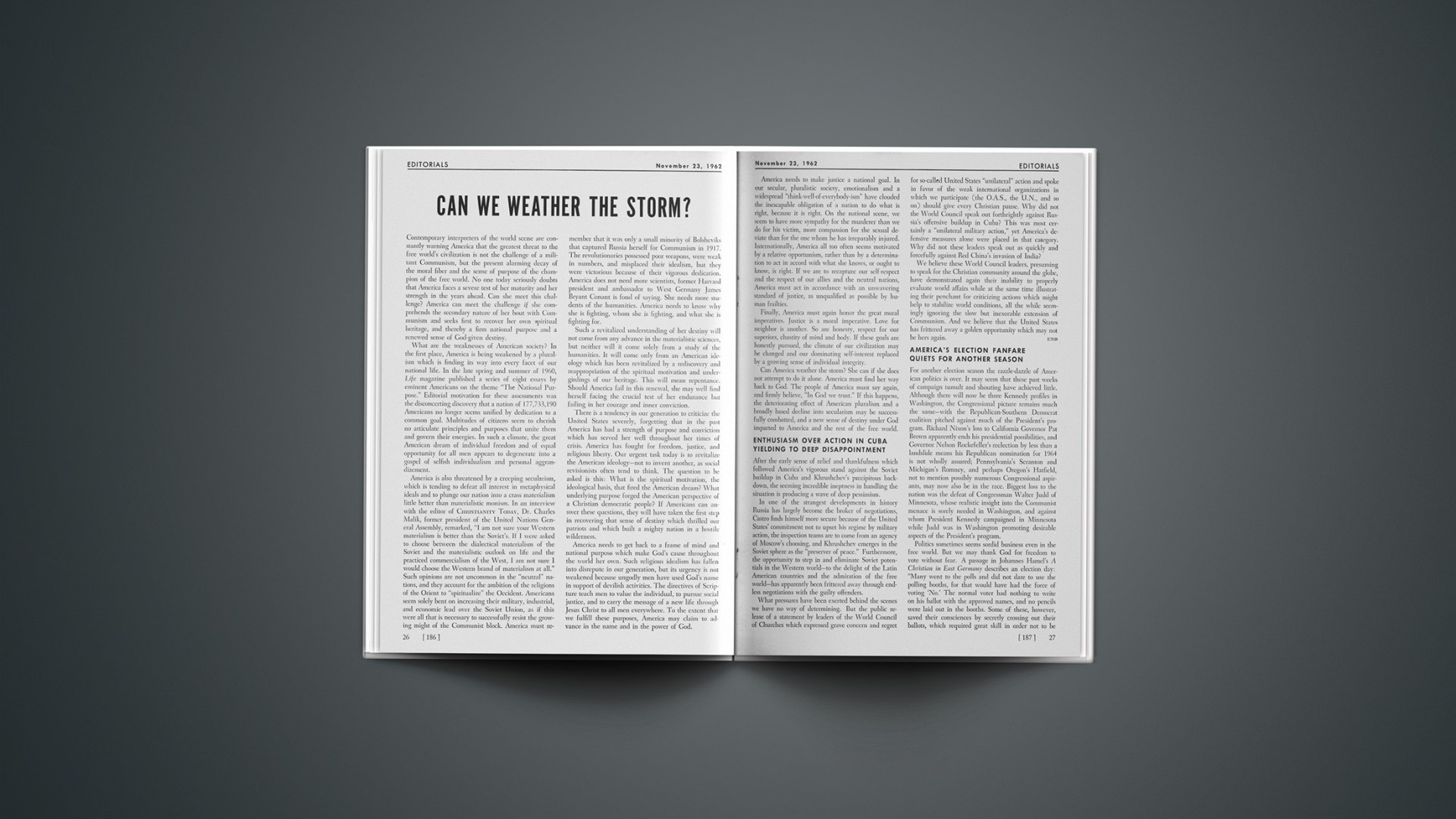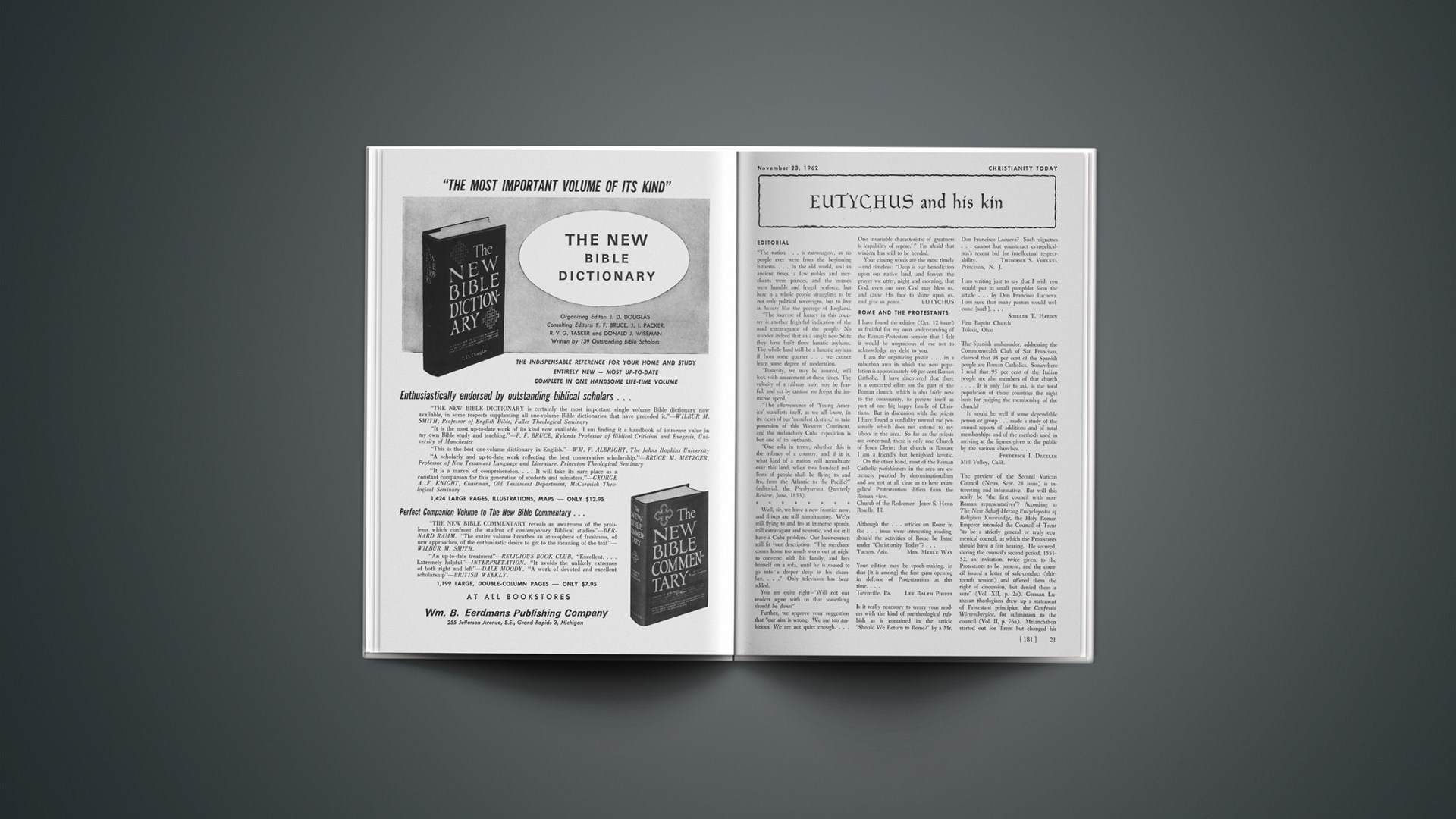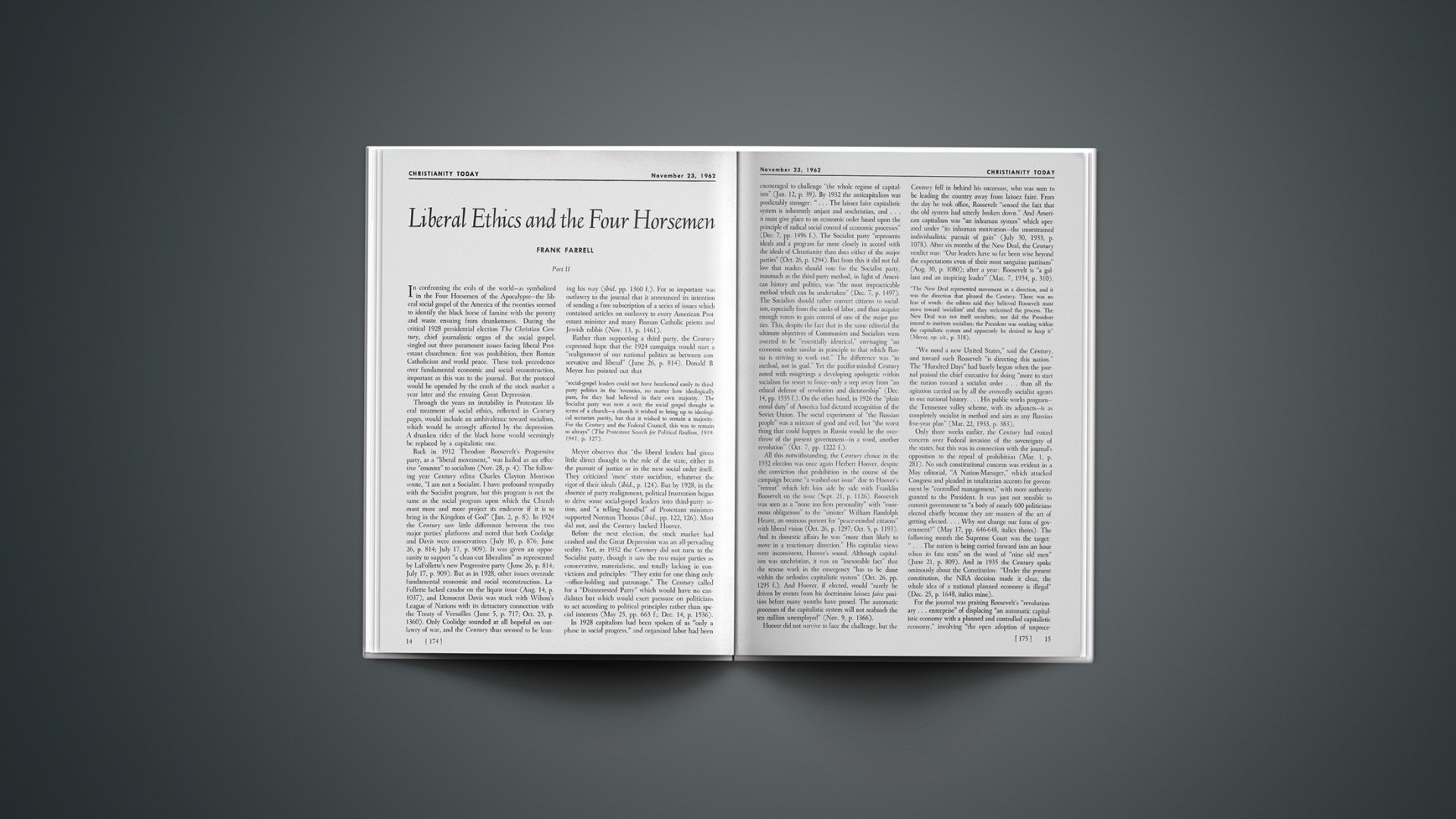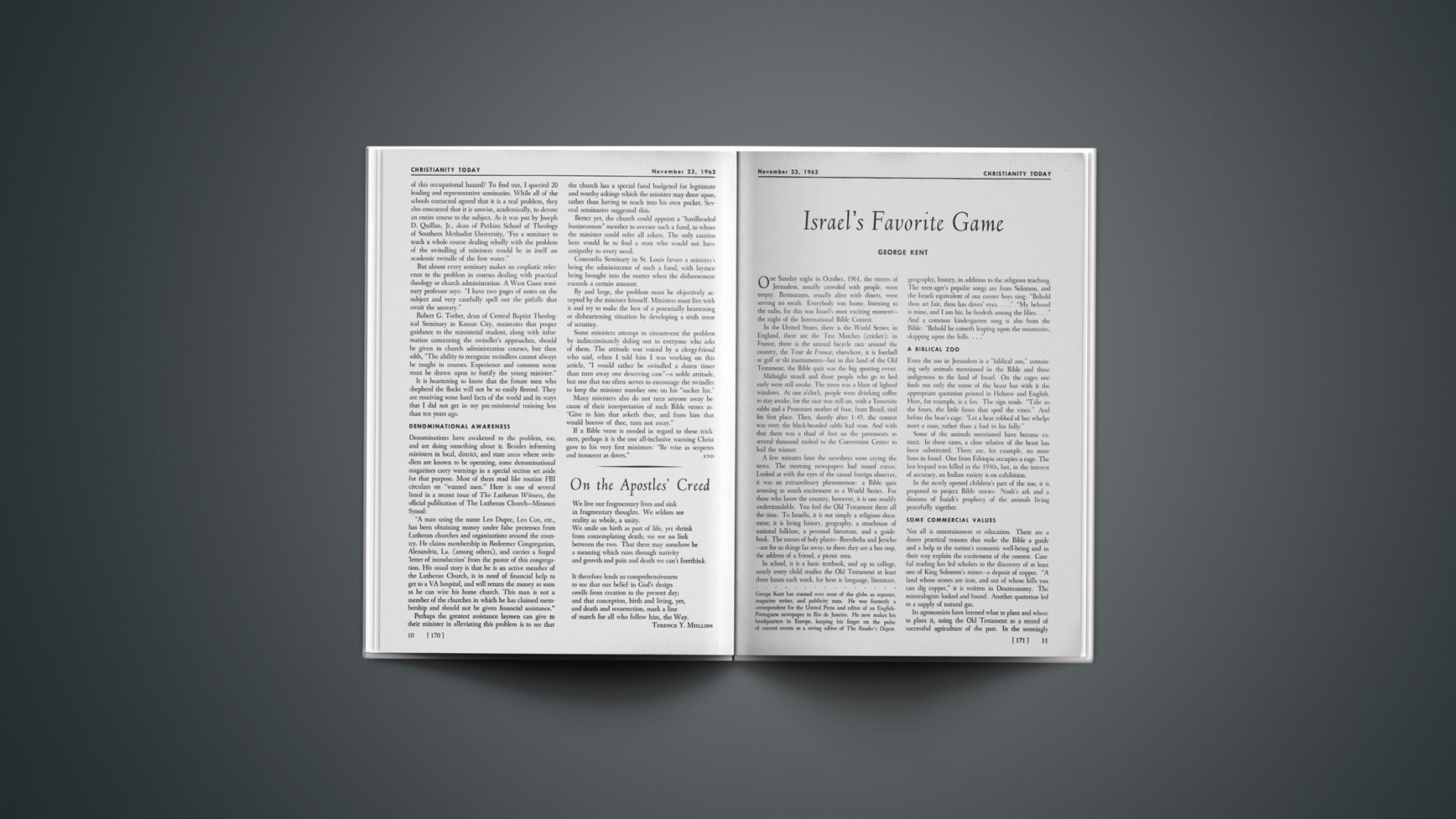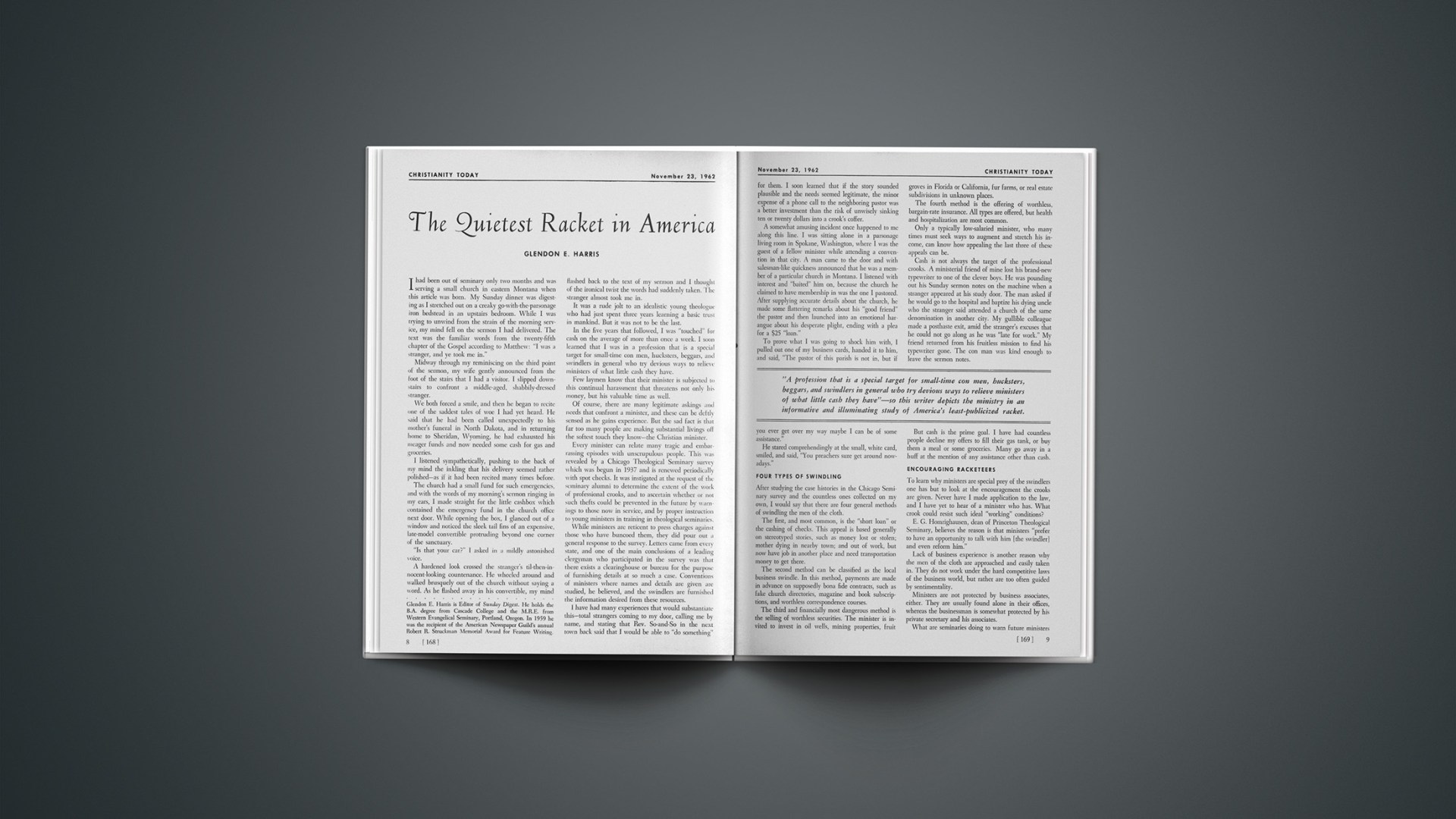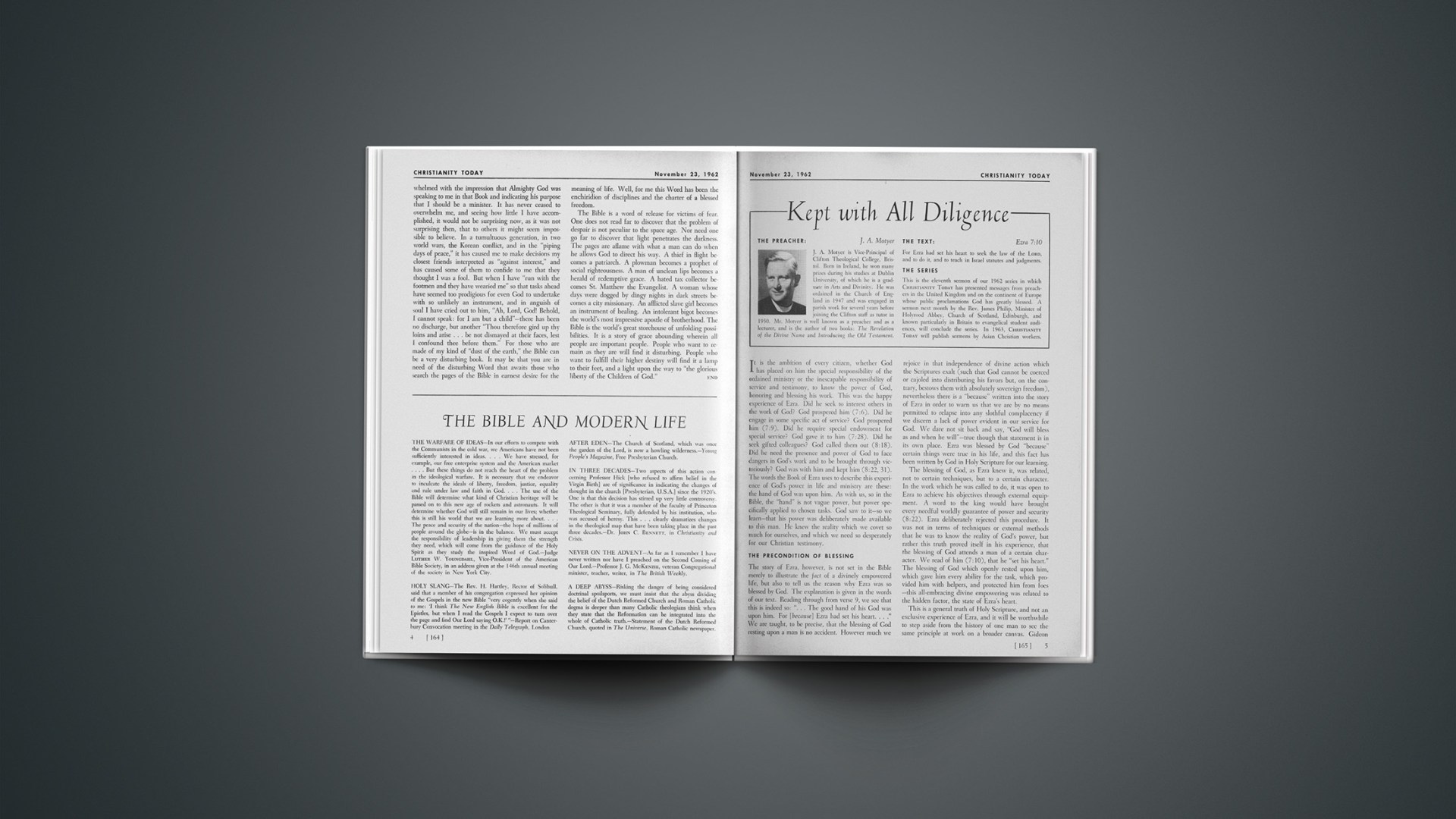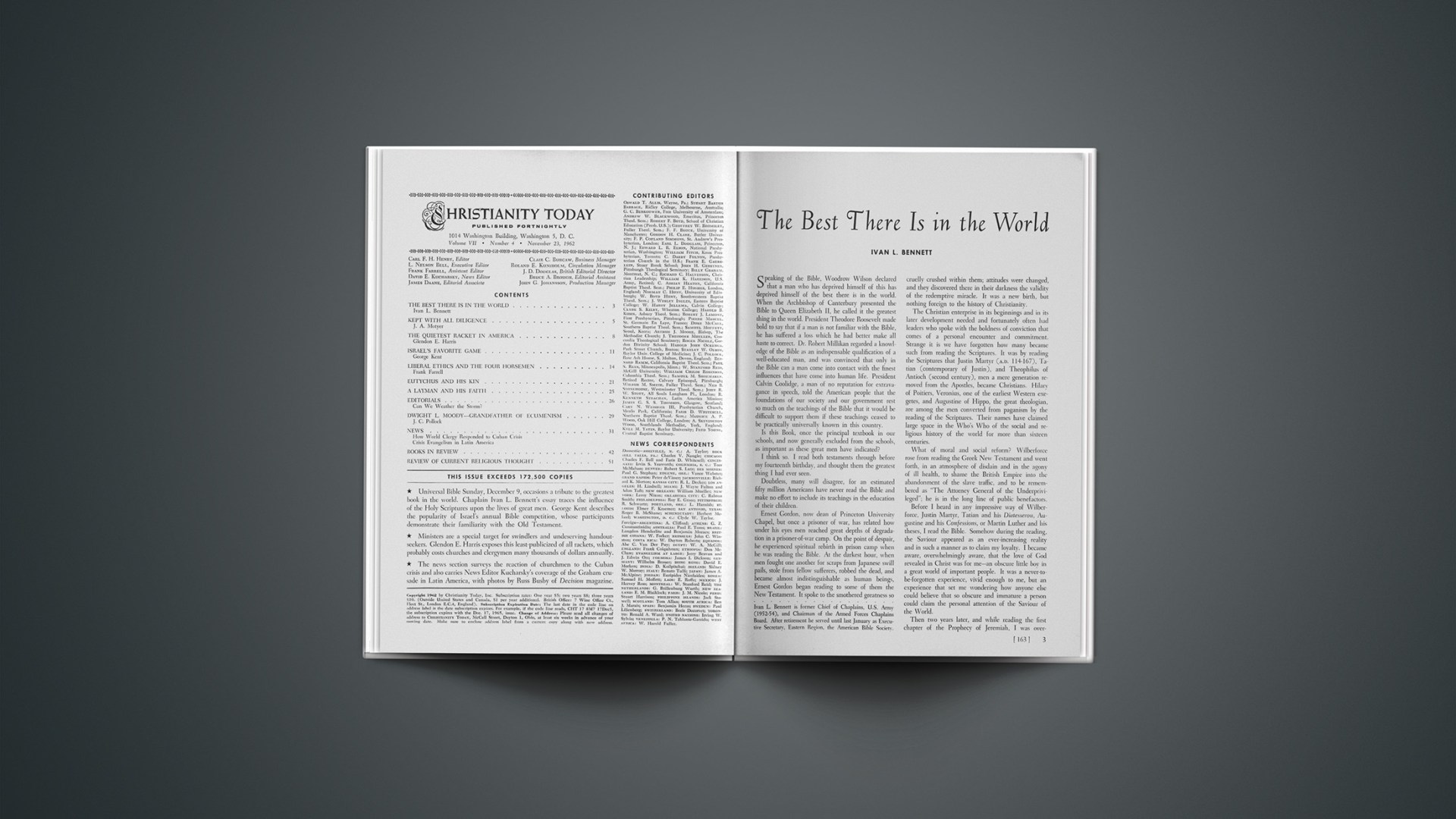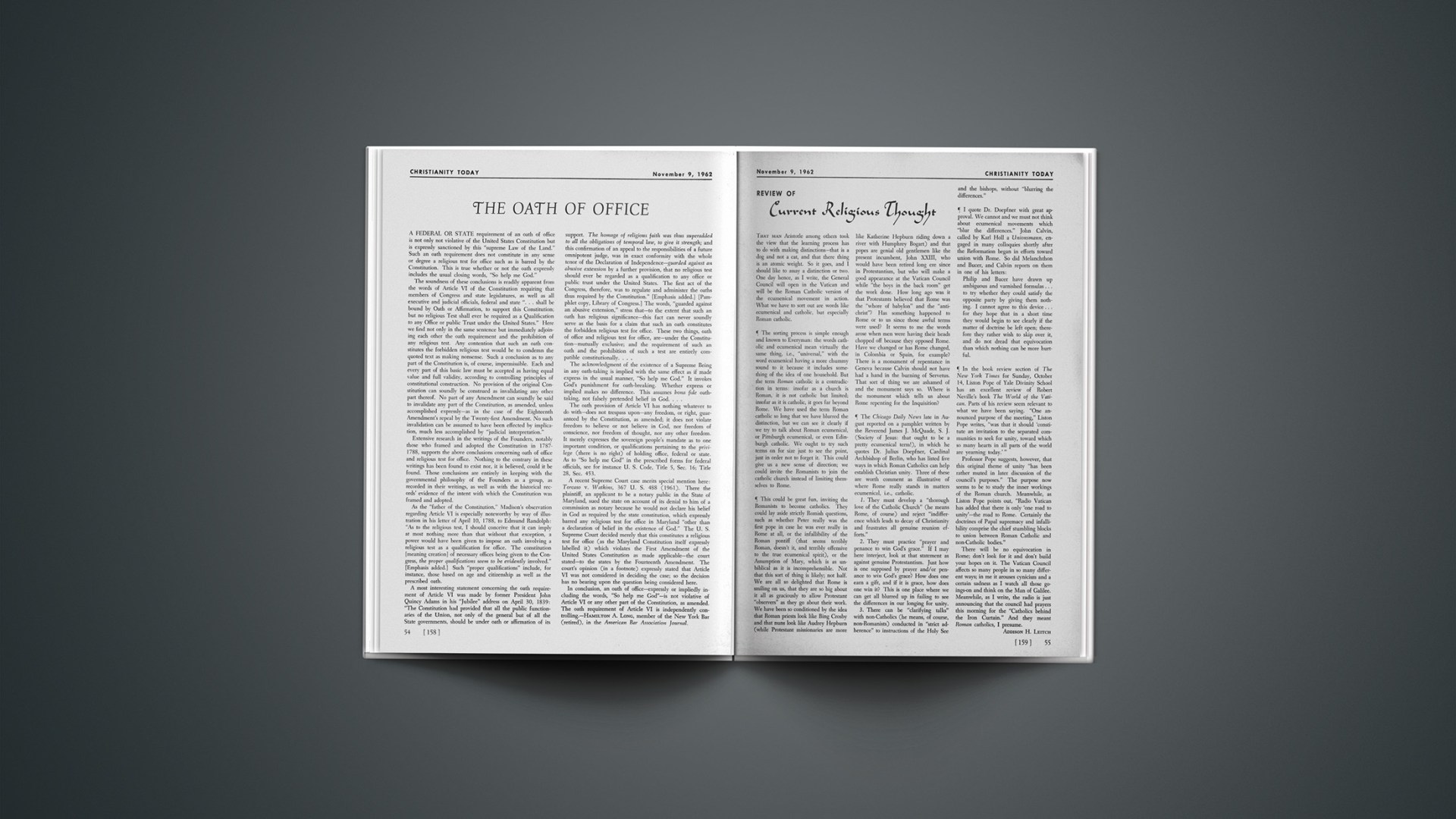Contemporary interpreters of the world scene are constantly warning America that the greatest threat to the free world’s civilization is not the challenge of a militant Communism, but the present alarming decay of the moral fiber and the sense of purpose of the champion of the free world. No one today seriously doubts that America faces a severe test of her maturity and her strength in the years ahead. Can she meet this challenge? America can meet the challenge if she comprehends the secondary nature of her bout with Communism and seeks first to recover her own spiritual heritage, and thereby a firm national purpose and a renewed sense of God-given destiny.
What are the weaknesses of American society? In the first place, America is being weakened by a pluralism which is finding its way into every facet of our national life. In the late spring and summer of 1960, Life magazine published a series of eight essays by eminent Americans on the theme “The National Purpose.” Editorial motivation for these assessments was the disconcerting discovery that a nation of 177, 733, 190 Americans no longer seems unified by dedication to a common goal. Multitudes of citizens seem to cherish no articulate principles and purposes that unite them and govern their energies. In such a climate, the great American dream of individual freedom and of equal opportunity for all men appears to degenerate into a gospel of selfish individualism and personal aggrandizement.
America is also threatened by a creeping secularism, which is tending to defeat all interest in metaphysical ideals and to plunge our nation into a crass materialism little better than materialistic monism. In an interview with the editor of CHRISTIANITY TODAY, Dr. Charles Malik, former president of the United Nations General Assembly, remarked, “I am not sure your Western materialism is better than the Soviet’s. If I were asked to choose between the dialectical materialism of the Soviet and the materialistic outlook on life and the practiced commercialism of the West, I am not sure I would choose the Western brand of materialism at all.” Such opinions are not uncommon in the “neutral” nations, and they account for the ambition of the religions of the Orient to “spiritualize” the Occident. Americans seem solely bent on increasing their military, industrial, and economic lead over the Soviet Union, as if this were all that is necessary to successfully resist the growing might of the Communist block. America must remember that it was only a small minority of Bolsheviks that captured Russia herself for Communism in 1917. The revolutionaries possessed poor weapons, were weak in numbers, and misplaced their idealism, but they were victorious because of their vigorous dedication. America does not need more scientists, former Harvard president and ambassador to West Germany James Bryant Conant is fond of saying. She needs more students of the humanities. America needs to know why she is fighting, whom she is fighting, and what she is fighting for.
Such a revitalized understanding of her destiny will not come from any advance in the materialistic sciences, but neither will it come solely from a study of the humanities. It will come only from an American ideology which has been revitalized by a rediscovery and reappropriation of the spiritual motivation and undergirdings of our heritage. This will mean repentance. Should America fail in this renewal, she may well find herself facing the crucial test of her endurance but failing in her courage and inner conviction.
There is a tendency in our generation to criticize the United States severely, forgetting that in the past America has had a strength of purpose and conviction which has served her well throughout her times of crisis. America has fought for freedom, justice, and religious liberty. Our urgent task today is to revitalize the American ideology—not to invent another, as social revisionists often tend to think. The question to be asked is this: What is the spiritual motivation, the ideological basis, that fired the American dream? What underlying purpose forged the American perspective of a Christian democratic people? If Americans can answer these questions, they will have taken the first step in recovering that sense of destiny which thrilled our patriots and which built a mighty nation in a hostile wilderness.
America needs to get back to a frame of mind and national purpose which make God’s cause throughout the world her own. Such religious idealism has fallen into disrepute in our generation, but its urgency is not weakened because ungodly men have used God’s name in support of devilish activities. The directives of Scripture teach men to value the individual, to pursue social justice, and to carry the message of a new life through Jesus Christ to all men everywhere. To the extent that we fulfill these purposes, America may claim to advance in the name and in the power of God.
America needs to make justice a national goal. In our secular, pluralistic society, emotionalism and a widespread “think-well-of-everybody-ism” have clouded the inescapable obligation of a nation to do what is right, because it is right. On the national scene, we seem to have more sympathy for the murderer than we do for his victim, more compassion for the sexual deviate than for the one whom he has irreparably injured. Internationally, America all too often seems motivated by a relative opportunism, rather than by a determination to act in accord with what she knows, or ought to know, is right. If we are to recapture our self-respect and the respect of our allies and the neutral nations, America must act in accordance with an unwavering standard of justice, as unqualified as possible by human frailties.
Finally, America must again honor the great moral imperatives. Justice is a moral imperative. Love for neighbor is another. So are honesty, respect for our superiors, chastity of mind and body. If these goals are honestly pursued, the climate of our civilization may be changed and our dominating self-interest replaced by a growing sense of individual integrity.
Can America weather the storm? She can if she does not attempt to do it alone. America must find her way back to God. The people of America must say again, and firmly believe, “In God we trust.” If this happens, the deteriorating effect of American pluralism and a broadly based decline into secularism may be successfully combatted, and a new sense of destiny under God imparted to America and the rest of the free world.
Enthusiasm Over Action In Cuba Yielding To Deep Disappointment
After the early sense of relief and thankfulness which followed America’s vigorous stand against the Soviet buildup in Cuba and Khrushchev’s precipitous backdown, the seeming incredible ineptness in handling the situation is producing a wave of deep pessimism.
In one of the strangest developments in history Russia has largely become the broker of negotiations, Castro finds himself more secure because of the United States’ commitment not to upset his regime by military action, the inspection teams are to come from an agency of Moscow’s choosing, and Khrushchev emerges in the Soviet sphere as the “preserver of peace.” Furthermore, the opportunity to step in and eliminate Soviet potentials in the Western world—to the delight of the Latin American countries and the admiration of the free world—has apparently been frittered away through endless negotiations with the guilty offenders.
What pressures have been exerted behind the scenes we have no way of determining. But the public release of a statement by leaders of the World Council of Churches which expressed grave concern and regret for so-called United States “unilateral” action and spoke in favor of the weak international organizations in which we participate (the O.A.S., the U.N., and so on) should give every Christian pause. Why did not the World Council speak out forthrightly against Russia’s offensive buildup in Cuba? This was most certainly a “unilateral military action,” yet America’s defensive measures alone were placed in that category. Why did not these leaders speak out as quickly and forcefully against Red China’s invasion of India?
We believe these World Council leaders, presuming to speak for the Christian community around the globe, have demonstrated again their inability to properly evaluate world affairs while at the same time illustrating their penchant for criticizing actions which might help to stabilize world conditions, all the while seemingly ignoring the slow but inexorable extension of Communism. And we believe that the United States has frittered away a golden opportunity which may not be hers again.
END
America’S Election Fanfare Quiets For Another Season
For another election season the razzle-dazzle of American politics is over. It may seem that these past weeks of campaign tumult and shouting have achieved little. Although there will now be three Kennedy profiles in Washington, the Congressional picture remains much the same—with the Republican-Southern Democrat coalition pitched against much of the President’s program. Richard Nixon’s loss to California Governor Pat Brown apparently ends his presidential possibilities, and Governor Nelson Rockefeller’s reelection by less than a landslide means his Republican nomination for 1964 is not wholly assured; Pennsylvania’s Scranton and Michigan’s Romney, and perhaps Oregon’s Hatfield, not to mention possibly numerous Congressional aspirants, may now also be in the race. Biggest loss to the nation was the defeat of Congressman Walter Judd of Minnesota, whose realistic insight into the Communist menace is sorely needed in Washington, and against whom President Kennedy campaigned in Minnesota while Judd was in Washington promoting desirable aspects of the President’s program.
Politics sometimes seems sordid business even in the free world. But we may thank God for freedom to vote without fear. A passage in Johannes Hamel’s A Christian in East Germany describes an election day: “Many went to the polls and did not dare to use the polling booths, for that would have had the force of voting ‘No.’ The normal voter had nothing to write on his ballot with the approved names, and no pencils were laid out in the booths. Some of these, however, saved their consciences by secretly crossing out their ballots, which required great skill in order not to be noticed by the pollwatchers who observed everyone closely on their way from the ballot table to the ballot box.…”
So we thank God even for the exuberance of American politics. The secret ballot is one of the anti-totalitarian world’s great strengths. But its wise use and survival require our reinforcement of its opportunities with a feeling for the will of God in political affairs, and not simply for the preference of the majority.
Secret Of Fundamentalism’S Vitality Escapes Analyst
It would be a sad illusion for liberal Protestantism to think fundamentalism is dead, says Professor Thomas C. Oden, because “whether we like it or not” it is “one of the most vital forces in American Christianity”. Yet he argues that it has lost “its essential reason for existing,” and now fights “straw men.”
In an article in The Christian Century Oden urges that fundamentalism, and not only the older liberalism, succumbed to nineteenth-century historicism. Fundamentalism’s great mistake, urges Oden, was that it was more interested in the historic facts of the Resurrection and the Incarnation than in their meanings.
But the fundamentalists’ insistence on the importance of the actual historical occurrence of saving events ought not to be confused with a view that the key to any reality lies in its historical origin. For fundamentalists insisted that the origin of Christ and his resurrection lay not in history but in God’s action, and they further insisted (contra the old liberalism) that man’s redemption lay not in the ideas of incarnation and resurrection but in their actual historical reality. This insistence is something quite other than the historicism of the nineteenth century. Fundamentalists were far too little interested in history to fall into historicism, but they were not such starry-eyed idealists as to think that sinners are saved by ideas. They knew that by “taking thought” a man cannot add even an inch to his statue. They rightly realized that an idea of a resurrection without the fact has no redemptive power. It is this dynamic of the Gospel which they sought to retain, and which explains why fundamentalists are still very much alive.
END
The Word Of God … Multiplied: But Not By These Modern Methods
Once upon a time there was a Holy Bible. It existed in a number of versions and in many languages. Recently there has been an explosion of modern translations both indicating and contributing to the new larger interest in Bible reading and study. All this was to the good.
Today, however, we are getting various kinds of Bibles. This is something new. One Bible is regarded as a liberal Bible, another as orthodox. We have also received the Modern Adult, the Teen-age, and the Children’s Bibles. The latest is the Concise Bible (Henry Regnery Co., Nov. 19, 1962), 189 pages of quotations and condensations of the Bible’s 66 books. This averages out to about three pages each; Colossians gets 13 lines, 3 John 7 lines, and John’s Gospel a trifle over four pages. For good measure ten pages of additional quotations are added in an Appendix; and for unintended irony the last verse quoted is: “And if any man shall take away from the words of the book of this prophecy, God shall take away his part out of the book of life, and out of the holy city, and from the things which are written in this book” (Rev. 22:19).
Christians can only commend attempts to provide faithful translations of the Scripture in the most understandable English possible, as they can only commend new ways to induce people to read the Bible. Yet alteration of faithful translations of Scripture, even if into language a child or a teen-ager can understand, involves violence to the sacred text. There is similar want of reverent respect when a very small fraction of biblical verses are quoted, interspersed with synopses, and then placed on the market under the title of The Bible. The publication of various kinds of Bibles will soon have the consequence that the term “Bible” no longer has definite meaning. Christians had best exercise caution lest they undercut the very thing they are trying to promote.
Heresy Of Universal Salvation Dulls Evangelistic Passion
In a matter of weeks the opportunity will have gone to enter CHRISTIANITY TODAY’S sermon competition (see June 22 issue for details) on the subject of human destiny, with special attention to speculations about universal salvation now leavening some of the churches.
Ministers who have failed to address their congregations on the final doom of the unsaved may well resolve anew to emphasize the inescapable consequences of the rejection of Jesus Christ. In fact, some leading Protestant denominations ought to ask why the evangelistic passion seems to have vanished in their midst.
One great denomination—once among the fastest-growing—has sunk to mediocre gains. The director of its Division of Evangelism is an addict of the Barthian narcotic that all men are already in Christ and need only to be informed of it. Some denominational circles are encouraged to become more theologically conservative whenever funds lag for approved denominational programs. It would be a great boon if American Baptists could rise instead to a new era of evangelistic greatness through a rediscovery of the biblical imperative. There is increasing talk of a Baptist Federation of North America or a North American Baptist Alliance as the next phase of ecumenical momentum following the present Baptist Jubilee Advance. It is noteworthy that Southern Baptists, who represent one of the fastest-growing denominations (without the multiplication of figures through mergers), and in fact the one which is now the biggest Protestant denomination in the United States, are at heart evangelistic. Were American Baptist leadership to take evangelism seriously again in biblical dimensions, it would be a genuine sign of advance and a real token of jubilee.
END
Are Sunday School Lessons Soft On Trinitarianism?
While scanning Southern Baptist Sunday school literature recently, we discovered a rather disconcerting ambiguity in some expositions of the doctrine of the Trinity. Although biblical Christianity is thoroughly monotheistic, and expounds the unity of God, it is anything but Unitarian. Yet one cannot help wondering what has happened to the historic Christian emphasis that in the one Godhead there are three eternal centers of consciousness, when one reads passages which seem to reduce the personal distinctions to differences of function, and which emphasize that God is “one Person.” For examples: “The ‘persons’ of the Godhead have different functions but a single purpose. They act in harmony. Indeed, they are one” (The Adult Teacher, October, 1962, p. 59). “The word ‘trinity’ comes from two roots—tri, meaning three, and unity, meaning unit or one. The word was originally ‘tri-unity,’ suggesting that God, who is really one Person, reveals himself in three characters, each personal in nature and each distinct and individual. We cannot comprehend intellectually the full meaning of ‘three in one.’ As you—one person—are body, mind, and soul, so God—one Person—is Father, Son, and Holy Spirit” (Sunday School Adults, Oct.-Nov.-Dec., 1962, pp. 17 f.). Unless we have forgotten how to read, Southern Baptist adults are being taught the profoundly unbiblical theory that the distinctions in the Godhead are not eternal personal distinctions, but functional or modal.
END
‘Feed The Chinese’ Urges Moderator As China Feeds On India
It’s a good thing, in some cases, that newspapers relegate religious news to inconsequential, second-rate pages! This was especially true late last month, when world events were moving at a heady pace.
On October 22, as front-page headlines of newspapers around the world screamed forth the fact that Red China was biting off huge chunks of India, Religious News Service carried a story which looked a bit out of place in the context of world events. “Churchman Urges Canada to Send Gift Grain to Red China,” was the headline. The story began, “Dr. James R. Mutchmore, moderator of the United Church of Canada, said … that gifts of grain to Red China would be ‘Christian, and common sense.’ ”
Reporting on the fine Canadian harvest, he said that wherever people are hungry, they should be fed. This is a laudable generality, but Dr. Mutchmore had evidently forgotten that David, for example, never fed a hungry predator, or threw a dog biscuit to a glowering wolf preparing to attack one of his flock.
In a broadcast to the Indian people on the same date, Prime Minister Nehru called the Chinese “powerful and unscrupulous opponents, not caring for peace or peaceful methods.”
Perhaps there are no newspapers in ivory towers.

